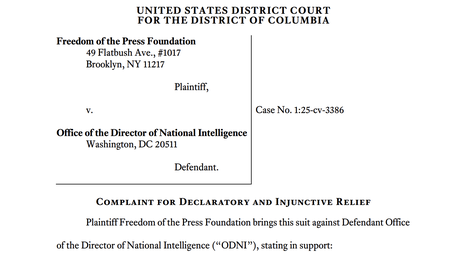Three new FPF FOIA suits target threats to transparency, press freedom


AP Illustration
The Freedom of Information Act gives the public a right to access government records.
The Freedom of Information Act is supposed to shed light on government activity by giving journalists and the public access to government records. But the law is in shambles. From endless delays in response time and unjustified refusals to ridiculously overbroad redactions, FOIA is plagued with problems.
We must fight back against the government’s refusal to comply with FOIA and urge Congress to reform the law and end backlogs of requests, reduce the number of exemptions, and overturn damaging court decisions.

Five important questions to ask about DOGE’s FOIA future

Plus: A judge ruled DOGE is likely subject to FOIA. But that doesn’t mean we’re guaranteed to see its records.

Plus: The government’s excuse for keeping a climate report hidden is easily disproved

Plus: Trump administration attacks the advisory committees that keep the government honest

Plus: Two upcoming secrecy fights and how to prepare for them

Plus: Don’t be mad DOGE posted classified budget information. Intelligence agencies’ budgets should be public

News outlets can help preserve the public domain, and maybe even gain some subscribers

Plus: Why should the public have to wait until 2034 to file FOIA requests with DOGE?

Trump and Musk are trying to use the Presidential Records Act’s giant loopholes to hide DOGE’s records

How DOGE handles agency records will show its commitment to (or disavowal of) government transparency rules, with implications for every federal office it accesses
Something went wrong and your email updates subscription could not be processed. Please visit our signup page and try again.
Thanks for helping us protect FOIA and the right of the press and public to know what the government is up to.
Share this message on social media: